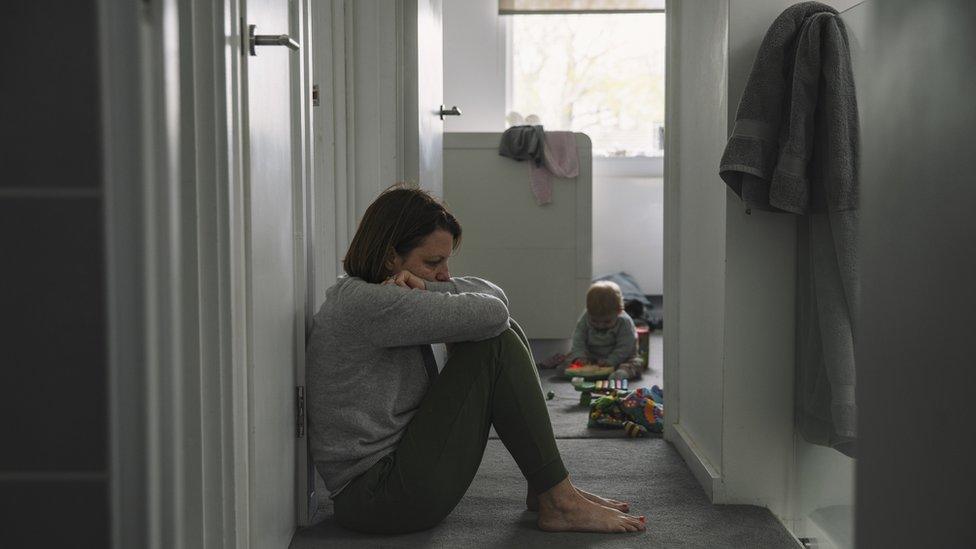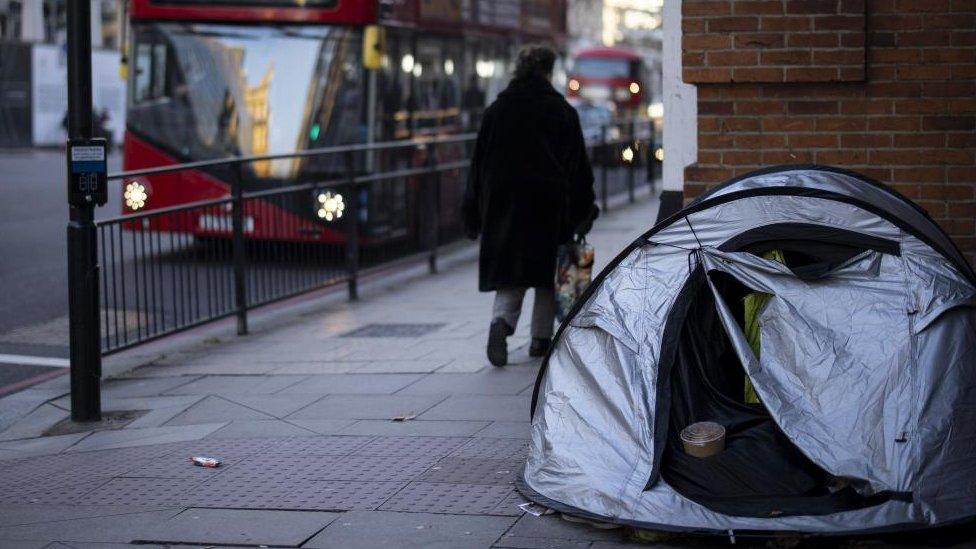More than 300,000 in England face being homeless at Christmas, charity estimates
- Published

More than 300,000 people in England are likely to spend Christmas experiencing some form of homelessness, according to a housing charity.
Shelter's estimated figure is 14% up on last year, with most of those affected being in temporary accommodation.
The charity said a lack of social housing and unaffordable private rents was some of the reasons for the rise.
The government said it was spending £2bn on tackling homelessness and plans to end rough sleeping completely.
Shelter estimates suggest that, across 2023, an average of 309,550 people are in some form of homelessness - with nearly 280,000 of those in temporary accommodation arranged by councils.
It collated the figures using government statistics, data collected by other homelessness charities, and responses from 40 out of the 317 local authorities in England to Freedom of Information requests to find out the number of people living in accommodation provided by social services.
Shelter said the numbers could be higher due to some "hidden homelessness" such as sofa-surfing.
Polly Neate, Shelter's chief executive said many people will "spend this time of year in a tiny hostel room or freezing in a doorway".
She said: "The housing emergency is out of control. Chronic under-investment in social homes has left people unable to afford skyrocketing private rents and plunged record numbers into homelessness."
Government figures published in November showed that the numbers of households and children living in temporary accommodation in England have hit new record highs.
It showed that 105,750 households were in temporary accommodation at the end of June, a new high since records began 25 years ago and an increase of 10.5% compared with the end of June 2022.
The total number of children in temporary accommodation - a measure which was first recorded in 2004 - was 138,930 as of the end of June this year.
Panic attacks
Victoria Fitzsimons, from near Manchester, told the BBC she and three of her children were living in noisy temporary accommodation above a pub, after the landlord of the house she was privately renting suddenly increased the price.
She said she was initially placed in two different B&Bs - one of which she described as "disgusting" - before they were moved to a three-bedroom property.
She was happy with the situation there, but was told to move again after what she was told was an administrative error.
"I felt suicidal. I'm in a better place now, but I can't believe how bad my mental health was," she said, adding that she came out in stress-induced hives.
The family has since been moved to new temporary accommodation above a pub, which has mould and damp and was "really noisy".
She said that her children often cannot sleep, and that their mental health had deteriorated.
"My 10-year-old has panic attacks. Her mental health is horrific," she said.
They are now waiting to be moved to new temporary accommodation, before they are eventually settled in permanent accommodation.
She said she had complained to Trafford Council about the noise, as well as about mould and damp in the property, but had been ignored.
In a statement, Trafford Council said it has been been in contact with the family since they were told to leave, as they have been "awarded the highest priority band on our housing register to access social housing and have been offered financial assistance towards a deposit and the first month's rent for a private rented property".
"While we continue to assist the family to secure settled housing, we have provided temporary accommodation for them," a spokesperson for the council told the BBC.
"Due to the exceptional demand on homelessness services, and limited availability of temporary accommodation, we are restricted to what we can offer at any one time."
The spokesperson added it will contact the family again to arrange a time for to treat the damp and mould.
Liz Rutherfoord, chief executive of Single Homeless Project, which focuses on London, said there had been a "big increase" in the number of people rough sleeping in recent months, which she described as "just the tip of the iceberg", with many of those classed as homeless living in temporary accommodation.
She also cited a decline in social housing as being behind the problem, as well as a freeze on the Local Housing Allowance - used to work out housing benefits - which had been in place since 2020.
Chancellor Jeremy Hunt ended the freeze in his Autumn Statement, and the increase will come into effect in April, but Ms Rutherfoord called for it to be introduced "immediately".
She said "people are not always a very long way from homelessness, and the circumstances that can lead you into homelessness," adding: "Some people will have something to fall back on, but not every has. So you can end up with very short notice with nowhere to live."
In response to the Shelter figures, a spokesman for the Department of Levelling Up, Housing and Communities, said that "everyone deserves a safe place to call home".
He said £1bn was being made available to councils to provide financial support for people to find a home and move out of temporary accommodation.
"Temporary accommodation is an important way of making sure no family is without a roof over their head, but councils must ensure it is temporary and suitable for families, who have a right to appeal if it doesn't meet their household's needs," the spokesperson said.
"Through our Rough Sleeping Strategy, we will continue to work to end rough sleeping completely."
Related topics
- Published4 November 2023
